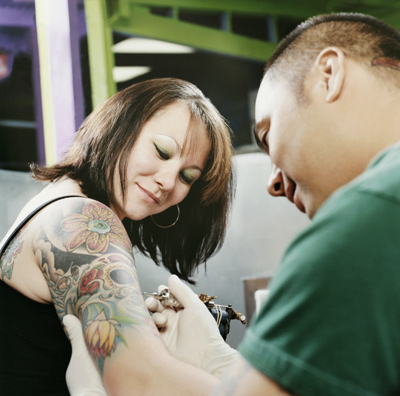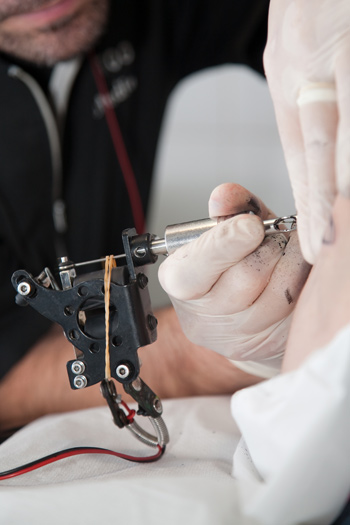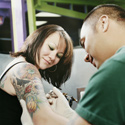Get a tattoo? What could go wrong?
Sometimes I feel like the only person around anymore without a tattoo.
I’ve just never liked anything enough to permanently put it on my body. Tattooing is an art of self and tribal expression that humans have been doing since we developed opposable thumbs.
In our puritanical Western mind, tattoos formerly were associated with criminals and sailors. A dermatology atlas from 1915 listed “Tattoo” as a psychological oddity. The black and white photo in the textbook was of a shirtless prisoner chained to a wall. What I believe were Irish gang symbols of the day covered his chest. Respectable citizens frowned upon the practice of tattooing. Today is different.
Tattoo Safety And The Health Risks Of Tattoos

The skin usually tolerates tattooing well, but introducing a foreign substance permanently into the skin can have unintended consequences. Mostly tattoos are exceedingly safe considering the volume being done. Even the old prison tattoos, with India ink or cigarette ash pushed into the skin, develop few problems.
I’ve seen patients discover they are allergic to various pigments after about six months of getting the tattoo, often with the color red.
It’s almost impossible for researchers to keep up with what the constituents are in each ink. Many inks are trade secrets and some artists blend their own. Some are not even ink but various pigments suspended in vegetable matter. Because of this, it is impossible to make an informed decision about your risk of allergic reaction (which is quite low).
More common than allergic reactions are formations of what are called granulomas. These little itchy bumps swell and develop around one or two colors. Typically this drives people crazy, as it both itches and distorts the artwork. However it is not dangerous.
Usually a tattoo is inert and completely ignored by the immune system, but in this instance the body is trying to protect itself from what it perceives as a foreign threat. White blood cells encase the pigment molecules and try to eradicate them, for unknown reasons. Maybe your skin doesn’t share your regard for that Lynyrd Skynyrd Free Bird eagle?
Infections with HIV or hepatitis are often blamed on tattoos in the media. In a licensed tattoo shop the infection risk is usually low. Recently a rare strain of a bacteria related to tuberculosis was isolated from tattoo rashes in several states. Upon investigation no issues were found with the equipment or technique, but with unsterile tap water used during the ink’s production.
Under the federal Food, Drug, and Cosmetic Act, tattoo inks are considered to be cosmetics, and the pigments used in the inks are color additives supposedly requiring premarket approval. But even the MDSS — Material Data Safety Sheet — from the company is an incomplete list. Also there is no specific FDA regulatory requirement mandating that tattoo inks must be sterile. I’m amazed we don’t see more infections, and this is a testament to the good hygiene practices adopted by the industry at large.

Tattoo Regret & Removal
Probably the worst complication is when you realize that your friend with the tattoo gun did not pass third grade spelling. I once saw, “Only God Can Juge Me!” on an otherwise attractive young lady’s back.
Some people believe a tattoo can be simply erased with a laser, but laser tattoo removal is evolving. It can take five or more sessions to erase simple one-color tattoos. Some intricate designs will cost thousands to remove, and may prove to be impossible. Black pigment responds best to most lasers. With other colors (especially blue or purple) get written assurance that the laser is calibrated for this. There are several good laser tattoo removal establishments in the area and I recommend shopping around.
Tattoos are safe and complications rare and manageable. Just know tattoo guns don’t have a spell-checker.
Dr. Derrick Adams is a board-certified dermatologist and the medical director of Vita Dermatology and Laser Institute, a division of Lassen Medical Group in Red Bluff. His office can be reached at 528-VITA.

